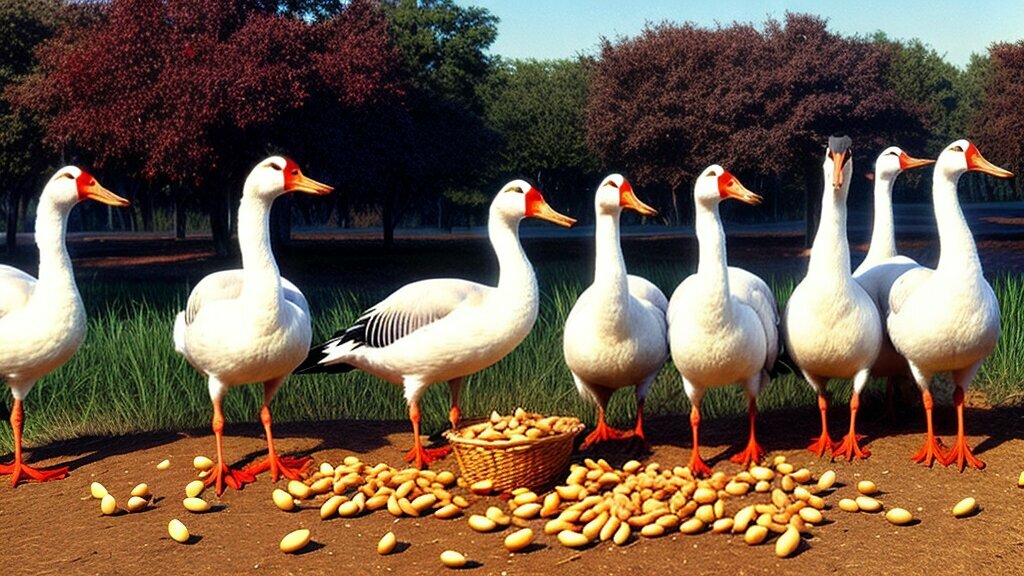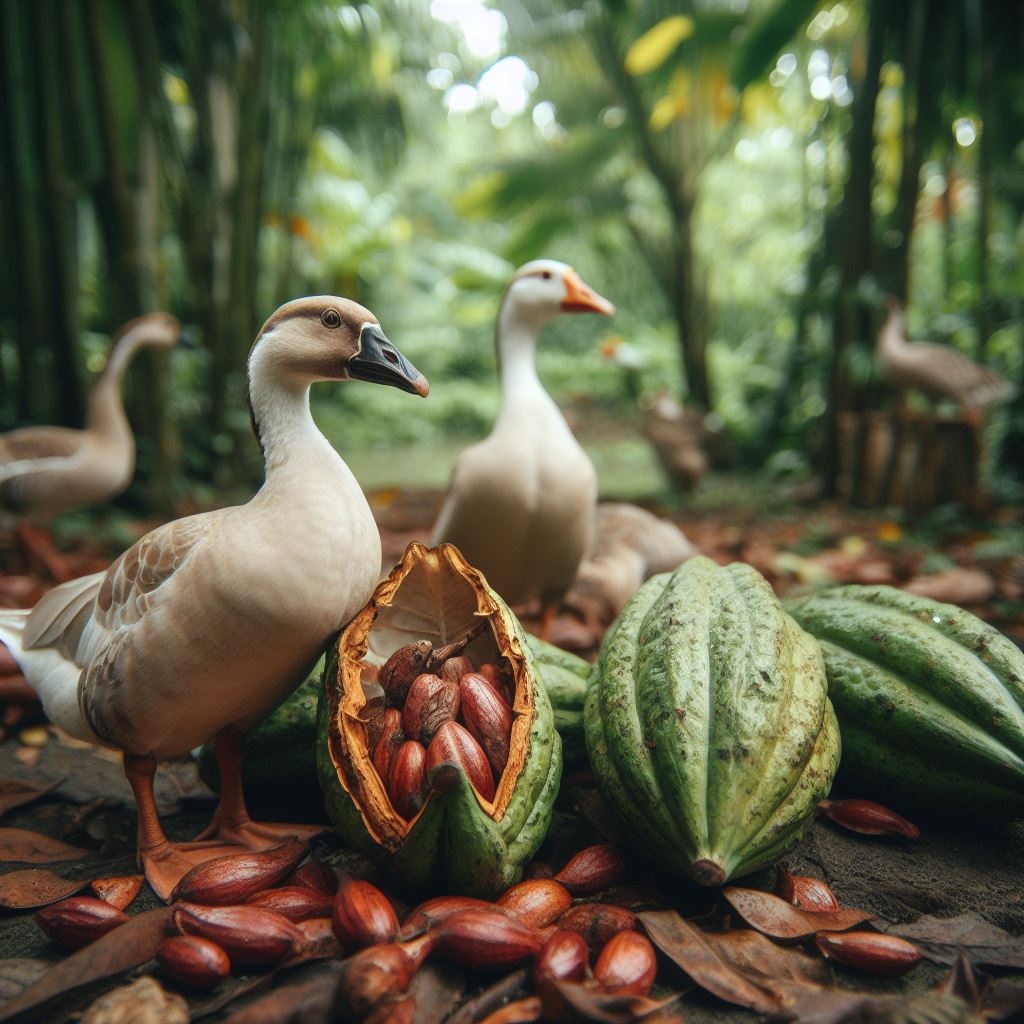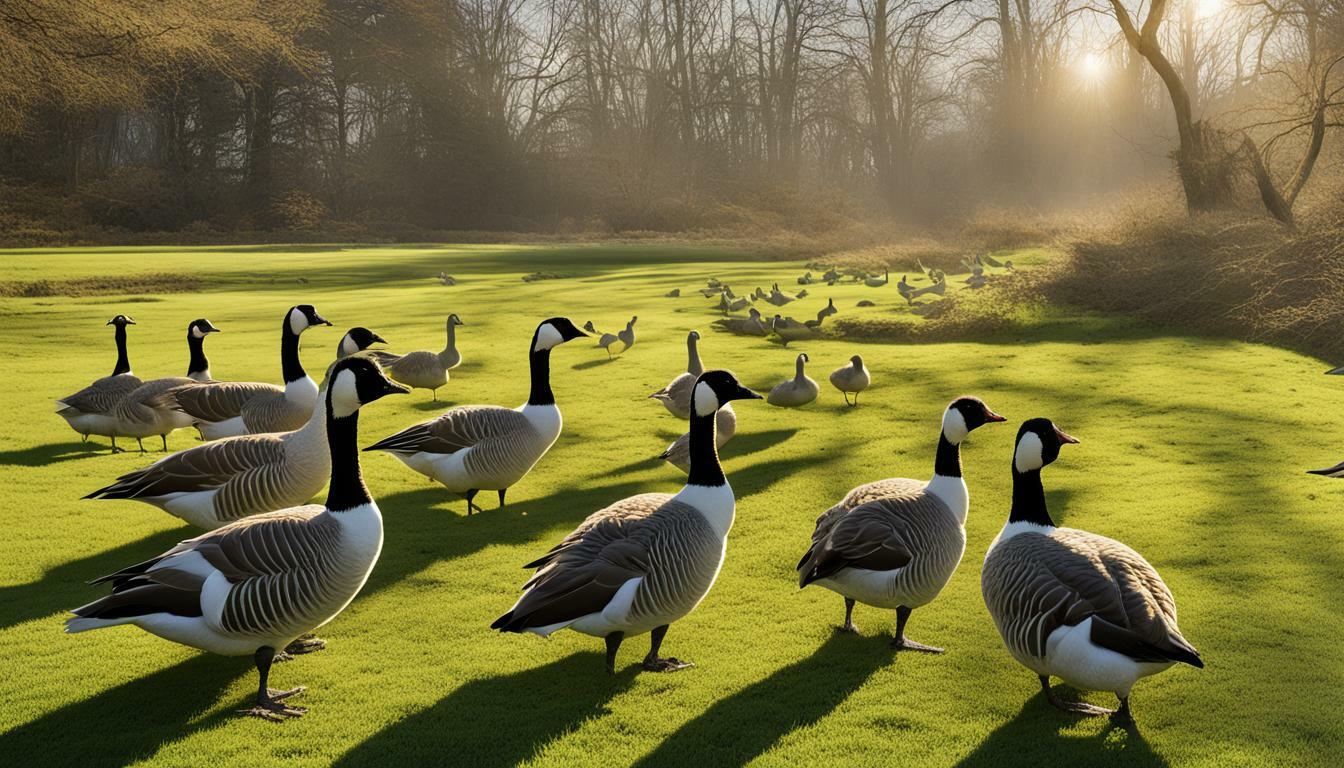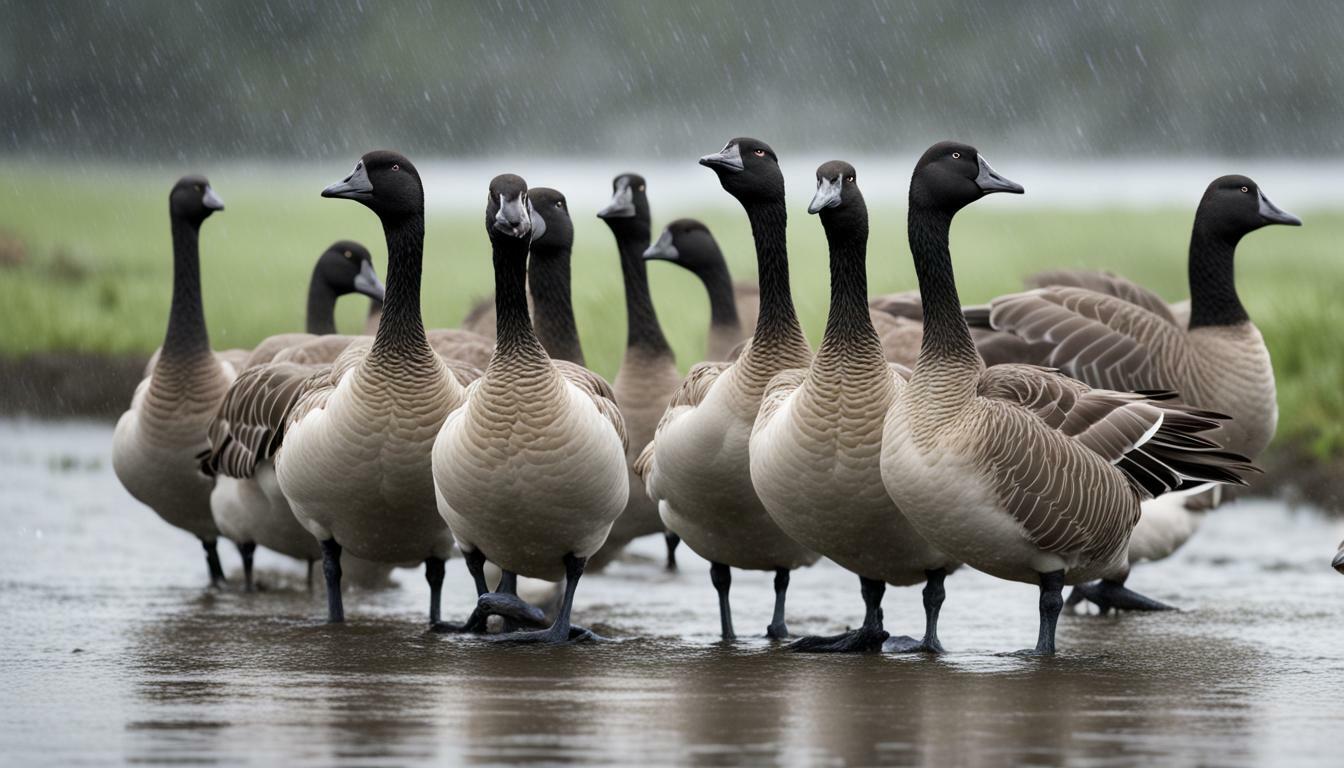Can Geese Eat Peanuts? Nutritious Snack

Table of content:
Peanuts make a convenient snack food for humans, but can our avian friends eat them too? Specifically, can geese eat peanuts? The short answer is yes, geese can eat peanuts in moderation as part of a balanced diet. Peanuts contain beneficial nutrients like healthy fats, plant protein and fiber. However, some precautions should be taken when feeding peanuts to our feathered pals.
An Overview of Geese Diet and Digestion
Before looking specifically at peanuts, it helps to understand what geese naturally eat and how their digestive system works. Geese are omnivores, meaning they eat both plant and animal matter.
In the wild, geese feed on grains, grasses, aquatic plants and sometimes small fish or insects. They need a diverse diet to get a wide range of vitamins, minerals and nutrients.
Geese have a digestive tract suited for breaking down fibrous vegetation. Their intestines contain beneficial bacteria that ferment plant materials. Geese also swallow small stones to grind up food in their gizzard.
When it comes to digestion, geese have a higher tolerance for toxins found in some plants compared to humans. But their system is not designed to handle large amounts of fats, sugars or excess salt. This will be important to keep in mind when feeding geese peanuts.
Nutritional Value of Peanuts for Geese
Now that we understand the basics of a goose’s dietary needs, we can analyze the nutritional value peanuts could provide:
- Healthy Fats – Peanuts contain mostly mono- and polyunsaturated fats which are better types of fats for heart health. The fat provides concentrated energy.
- Plant Protein – Peanuts have over 25% protein content. Protein provides amino acids for muscle maintenance and growth.
- Fiber – Peanut skins are a good source of fiber. Fiber promotes digestion and gut health.
- Antioxidants – Peanuts contain antioxidants like vitamin E and resveratrol. These can neutralize free radicals and prevent cell damage.
- B Vitamins – Peanuts provide B vitamins like niacin, riboflavin, folate. B vitamins help convert food to energy.
So peanuts can add beneficial nutrients to a goose’s diet in moderation. The fat and protein provide energy while the fiber aids digestion. Next let’s look at some risks and precautions.
Potential Risks of Feeding Peanuts to Geese
While peanuts have nutritional value, there are some potential risks to be aware of when feeding them to geese:
Choking Hazard
- Whole peanuts can present a major choking risk. Geese do not have teeth to grind up the nuts.
- It’s best to chop or crush peanuts into small pieces before feeding to geese to prevent choking.
High Fat Content
- While healthy fats are good, peanuts are very high in fat. Too much added fat can lead to obesity and liver issues.
- It’s best to limit the amount of peanuts offered and not make them a primary food source.
Contaminants
- Raw peanuts may contain traces of aflatoxins, a toxic mold byproduct. Very high levels can cause liver damage.
- Also, many roasted peanuts have added salt. Excess salt is unhealthy for geese.
- To reduce risk, feed fresh, unsalted peanuts in moderation. Avoid old moldy nuts.
With proper precautions, the risks of peanuts can be minimized. Next we’ll cover some best practices for safely feeding geese peanuts.
Best Practices for Feeding Peanuts to Geese
When feeding peanuts to geese, follow these safety tips:
- Remove shells from peanuts before feeding. The shells are a digestive irritant.
- Chop peeled nuts into very small pieces. Crushed peanuts reduce choking risk.
- Offer peanut pieces as a treat, not daily diet staple. Feed just a handful at a time.
- For young goslings, chop nuts extra fine. Their throats are more vulnerable to obstruction.
- Provide fresh drinking water when feeding peanuts. This aids digestion.
- Avoid feeding moldy or discolored peanuts that could contain toxins. Inspect nuts first.
- Buy raw, unsalted peanuts when possible. Avoid added salt or preservatives.
- Monitor goose droppings when introducing peanuts. Stop feeding if loose stools develop.
- Weigh geese periodically if feeding peanuts long-term. Check for signs of obesity.
By taking precautions, peanuts can provide nutritional variety without causing harm. It’s also important to keep variety in a goose’s diet.
Importance of a Balanced Diet
While geese can eat peanuts, they should not form the bulk of their diet. For balanced nutrition, geese need:
- High-fiber greens – Provides vitamin K, carotenoids, magnesium. Feed leafy greens, duckweed.
- Insects/aquatic animals – Excellent protein source. Provides iron, amino acids.
- Grains and seeds – Carbs for energy. Healthy fatty acids. Include grains like wheat, barley or rice.
- Calcium-rich foods – For bone health. Offer oyster shells, crumbled eggshells or spinach.
- Freshwater – Helps digest food and provide electrolytes. Change water daily.
Peanuts make a fine supplemental snack a few times a week. But a diverse diet is key to a goose’s health. Feeding peanuts should never replace providing proper nutritional basics.
Can Geese Eat Peanuts in the Shell?
Some people wonder if geese can consume peanuts still in the shell whole. Unfortunately, geese cannot properly digest peanuts in the shell. Here’s why:
- Geese don’t have teeth to break open the hard peanut shell. Their beaks are designed for fleshy or tender vegetation.
- The fibrous shell would pass through undigested. At best it would irritate the digestive tract. At worst, it could cause a dangerous blockage.
- Whole nuts in the shell pose a major choking hazard. Geese have a reflex to swallow food whole without chewing.
For safety, it’s critical to remove the shell before feeding peanuts to geese. The shell should be discarded or composted. Only feed the shelled inner nuts to birds.
Can Canadian Geese Eat Peanuts?
Canadian geese are one of the most common wild goose species people often encounter. Since they frequent parks and ponds, many people like feeding them. But can these iconic geese eat peanuts too?
The answer is yes, Canadian geese can safely eat shelled, chopped peanuts as part of their diet. Here are some tips:
- Canadian geese have the same nutritional needs and digestive systems as other geese.
- They forage on grasses, aquatic plants and grains. Peanuts offer supplemental fat and protein.
- Always remove the shell completely and chop peanuts into tiny pieces for Canadian geese.
- Feed chopped nuts in limited amounts. Too much can lead to choking or obesity.
- Offer peanuts occasionally as a treat. Make sure a balanced diet is still provided.
- Avoid feeding Canadian geese excess bread. Though they love it, too much can cause malnutrition and disease called angel wings.
With some basic precautions, peanuts can be a safe snack for Canadian geese too. Just be mindful of quantities and keep their overall diet diverse.
Feeding Peanuts to Geese
To summarize key points on whether geese can eat peanuts:
- Geese can eat chopped, shelled peanuts safely in moderation. The healthy fats, protein and fiber provide added nutrition.
- Take care to avoid choking hazards by removing shells and chopping peanuts up finely before feeding.
- Feed peanuts in limited amounts as an occasional treat, not a staple food. Too many can lead to obesity or illness.
- Keep plenty of fresh water available when feeding peanuts to help digestion.
- Monitor goose health and droppings for any signs of digestive upset when adding new foods.
- Peanuts should supplement a diverse diet including greens, grains, protein sources and calcium for balanced nutrition.
- Both domestic and wild geese like Canadian geese can eat peanuts when proper precautions are followed.
While peanuts make a convenient snack for people, they should be fed sparingly to our feathered friends. With some common sense precautions, peanuts can be a safe, healthy supplemental food for geese. If ever unsure, consult an avian nutritionist or wildlife rehabilitator for advice. With the right diet and care, our honking household companions will stay happy and healthy for many years to come.
Welcome. I’m Adreena Shanum, the proud owner of this website, and I am incredibly passionate about animals, especially poultry. I founded adreenapets.com as a labor of love, stemming from my desire to share my knowledge and experiences with poultry enthusiasts worldwide.




